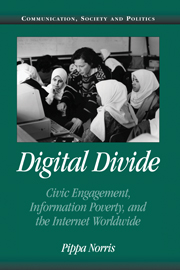Book contents
- Frontmatter
- Contents
- List of Tables
- List of Figures
- Preface
- PART I INTRODUCTORY FRAMEWORK
- 1 The Digital Divide
- 2 Understanding the Digital Divide
- 3 Wired World
- 4 Social Inequalities
- PART II THE VIRTUAL POLITICAL SYSTEM
- PART III THE DEMOCRATIC DIVIDE
- Appendix A Nations in the Study and Abbreviated Names Used in Figures
- Notes
- Select Bibliography
- Index
2 - Understanding the Digital Divide
Published online by Cambridge University Press: 05 June 2012
- Frontmatter
- Contents
- List of Tables
- List of Figures
- Preface
- PART I INTRODUCTORY FRAMEWORK
- 1 The Digital Divide
- 2 Understanding the Digital Divide
- 3 Wired World
- 4 Social Inequalities
- PART II THE VIRTUAL POLITICAL SYSTEM
- PART III THE DEMOCRATIC DIVIDE
- Appendix A Nations in the Study and Abbreviated Names Used in Figures
- Notes
- Select Bibliography
- Index
Summary
Debate about the impact of the rise of the Information Society has produced deeply contested visions predicting the future direction of trends. Optimists hope that the development of the Internet has the capacity to reduce, although not wholly eradicate, traditional inequalities between information-rich and -poor both between, and within, societies. In contrast, pessimists believe that the digital technologies will reinforce and exacerbate existing disparities. Skeptics suggest that both the fears and hopes are exaggerated, with technologies adapting to the social and political status quo, rather than vice versa. What evidence would help to settle these claims? How can we move from the Frank Capra and the Ingmar Bergman visions toward a more systematic understanding of the impact of the Information Society? It remains difficult to sort the facts from the hype, despite the burgeoning literature on all aspects of the Internet ranging from Web design, software development, and e-commerce to the sociology of the network society, group identities, and virtual culture. Studies in any discipline assessing the impact of the Internet face three main challenges: the problems of studying a phenomenon undergoing rapid change; the limitations of the available cross-cultural evidence allowing us to generalize beyond the experience of the United States; and the difficulties of developing and integrating triangulated methodologies drawn from different disciplines.
THE RAPID PACE OF CHANGE
The first challenge is the rapid pace of technological innovation and social adaptation so that studies of the impact of info-tech represent blurred snapshots of a moving bullet.
- Type
- Chapter
- Information
- Digital DivideCivic Engagement, Information Poverty, and the Internet Worldwide, pp. 26 - 38Publisher: Cambridge University PressPrint publication year: 2001
- 2
- Cited by



